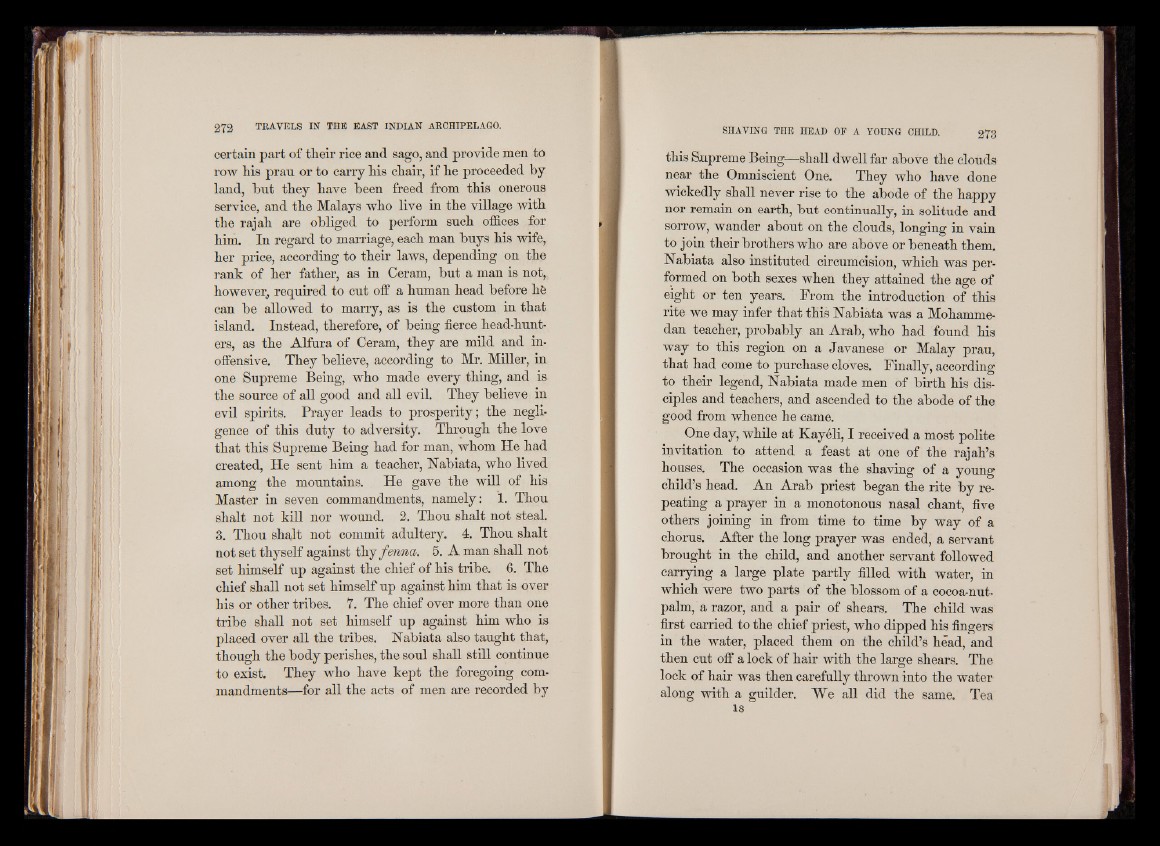
certain part of their rice and sago, and provide men to
row his pran or to carry his chair, if he proceeded by
land, but they have been freed from this onerous
service, and the Malays who live in the village with
the rajah are obliged to perform such offices for
him. In regard to marriage, each man buys his wife,
her price, according to their laws, depending on the
rank of her father, as in Ceram, but a man is not,,
however, required to cut off a human head before he
can be allowed to marry, as is the custom in that
island. Instead, therefore, of being fierce head-hunters,
as the Alfara of Ceram, they are mild and inoffensive.
They believe, according to Mr. Miller, in
one Supreme Being, who made every thing, and is
the source of all good and all evil. They believe in
evil spirits. Prayer leads to prosperity; the negligence
of this duty to adversity. Through the love
that this Supreme Being had for man, whom He had
created, He sent him a teacher, Nabiata, who lived
among the mountains. He gave the will of his
Master in seven commandments, namely: 1. Thou
shalt not kill nor wound. 2. Thou shalt not steal.
3. Thou shalt not commit adultery. 4. Thou shalt
not set thyself against thy fenna. 5. A man shall not
set himself up against the chief of his tribe. 6. The
chief shall not set himself1 up against him that is over
his or other tribes. 7. The chief over more than one
tribe shall not set himself up against him who is
placed over all the tribes. Nabiata also taught that,
though the body perishes, the soul shall still continue
to exist. They who have kept the foregoing commandments—
for all the acts of men are recorded by
this Supreme Being—shall dwell far above the clouds
near the Omniscient One. They who have done
wickedly shall never rise to the abode of the happy
nor remain on earth, but continually, in solitude and
sorrow, wander about on the clouds, longing in vain
to join their brothers who are above or beneath them.
Nabiata also instituted circumcision, which was performed
on both sexes when they attained the age of
eight or ten years. From the introduction of this
rite we may infer that this Nabiata was a Mohammedan
teacher, probably an Arab, who had found his
way to this region on a Javanese or Malay prau,
that had come to purchase cloves. Finally, according
to their legend, Nabiata made men of birth his disciples
and teachers, and ascended to the abode of the
good from whence he came.
One day, while at Kayeli, I received a most polite
invitation to attend a feast at one of the rajah’s
houses. The occasion was the shaving of a young
child’s head. An Arab priest began the rite by repeating
a prayer in a monotonous nasal chant, five
others joining in from time to time by way of a
chorus. After the long prayer was ended, a servant
brought in the child, and another servant followed
carrying a large plate partly filled with water, in
which were two parts of the blossom of a cocoa-nut-
palm, a razor, and a pair of shears. The child was
first carried to the chief priest, who dipped his fingers
in the water, placed them on the child’s head, and
then cut off a lock of hair with the large shears. The
lock of hair was then carefully thrown into the water
along with a guilder. We all did the same. Tea
18